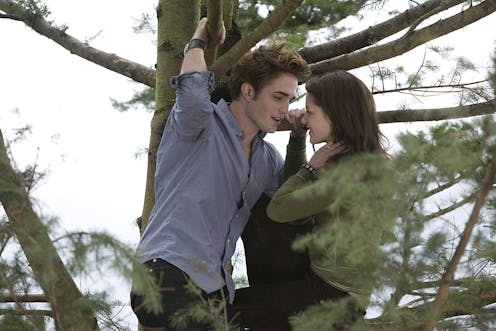 Romantic love is an increasingly popular topic of study within the academy, exploring issues ranging from how technology is changing relationships to masculinity as depicted in the Twilight books and films. Summit Entertainment, Temple Hill Entertainment, Maverick Films
Romantic love is an increasingly popular topic of study within the academy, exploring issues ranging from how technology is changing relationships to masculinity as depicted in the Twilight books and films. Summit Entertainment, Temple Hill Entertainment, Maverick Films We must discover … the redemptive power of love. And when we do that, we will make of this whole world a new world. But love, love is the only way.
In his spirited sermon at the 2018 wedding of Prince Harry and Meghan Markle, US Bishop Michael Curry, Primate of the Episcopal Church, quoted these words of Dr Martin Luther King. Dr Curry went on to describe love’s transformative power for humanity: “Think and imagine a world where love is the way,” he urged the congregation.
In universities across the world, academics are doing just that. Love Studies, a field newly emerged in the last couple of decades, is becoming an increasingly significant area of application and research.
There are journals and conferences on Love Studies, websites about popular romance such as Teach Me Tonight and a growing number of Phds in the field. But what exactly is it?
Love Studies emerged from discourse and analyses in popular romance, cultural and gender studies. In its first flush, it included a revaluing and deeper understanding of the complexity and sophistication of love, in particular romantic love, and how it has shaped our ways of being and knowing.
As academic Virginia Blum once put it when writing about the discipline:
While sex may indeed ‘sell’, love seems to trump sex every time when it comes to talking about the nature of individual autonomy and happiness.
Gradually, the idea of romantic love began to be explored in other subject areas: in philosophy, law, languages and literary studies, politics, anthropology and social science. Love Studies looked at desire, and intimate relationships, gender and power while retaining a critical wariness about the costs of love to women. Meanwhile, in psychology, there has been a renewed focus on happiness and loving-kindness.
Read more: What is this thing called love?
Today, Love Studies is becoming more clearly defined and developed. Last year, The Journal of Popular Romance Studies produced a special issue on Critical Love Studies. It looked at such things as the juxtaposition of popular romance and queer theory, “love migrants” who conduct much of their relationship long distance over Skype, “boy love” in Japanese romance fiction and masculinity in Stephenie Meyer’s Twilight novels (The latter article was titled: Is Edward Cullen a good boyfriend? Young men talk about Twilight, masculinity and the rules of heteroromance).
 Technology is transforming romantic relationships.shutterstock
Technology is transforming romantic relationships.shutterstockThis October, meanwhile, a global conference called LOVE, ETC will be held in Denmark. Situating love as the hot new topic in the academy, it will embrace issues such as how love is being transformed in the age of online dating and the challenging of gender and sexuality norms. How will love change in the technological future? (Will we come to love robots?) What’s the difference between love and caring?
At the same time, courses on popular romance are growing globally and romance research collections in libraries are expanding.
Some have suggested that in the 21st century, love is one of the existential goals of our lives. It can be both subversive or conservative, depending on your point of view.
Read more: There are six styles of love. Which one best describes you?
Indeed romantic love is no easy subject. It’s the front line: where our hearts, minds and bodies meet. For some, it’s a battlefield. Revenge porn. Intimate partner violence. Date rape. Sexual harassment. Online bullying. Abusive relationships. There’s a lot of damage done when we get up close and personal.
Some may call the study of love shallow, superficial too chocolatey and commercial. A bit like Valentine’s Day. While there has long been stigma and disdain for the area as lacking sufficient gravitas, for some academics, it’s the sweet spot.
As a romance novelist, Love Studies helps me to think through issues in my own writing. As an academic, I am working with colleagues in the fields of psychology, sexology and cultural studies, to explore issues of consent post #MeToo and how “civil rights” can be enacted in the bedroom, without repressing desire.
Love is as love does. It is not an end in itself, a happy ever after, but a creative process providing endless opportunities for thought and imagination. It remains to be seen if a new world, of which Martin Luther King dreamed, can be made of it.
Elizabeth Reid Boyd does not work for, consult, own shares in or receive funding from any company or organisation that would benefit from this article, and has disclosed no relevant affiliations beyond their academic appointment.
Authors: Elizabeth Reid Boyd, Senior Lecturer School of Arts and Humanities, Edith Cowan University
| < Prev | Next > |
|---|







